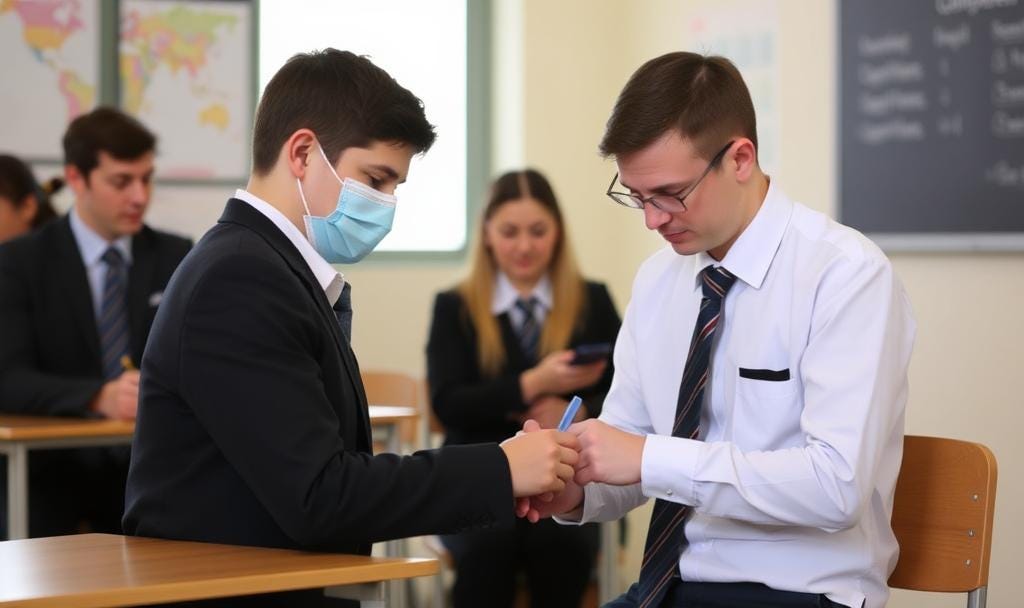After a career in education spanning close to 60 years I find it hard to believe that in 2025 we continue with a system of schooling that for too many young people retains characteristics of a model that was invented over 100 years ago. It is a model which is still too focussed on filling young minds with stuff that too often has little relevance to their present or future lives; that believes assigning numbers attests to the quality of their education: that learning takes place in silos when so many of the issues and problems we all face require inter-disciplinary problem solving, and when qualities such as communication, co-operation, critical thinking and creativity are accepted as the keys to finding solutions and to future success in life and in work.
I am concerned that so many still believe that the prime purpose of schooling is to grade and sort young people solely on ‘scores’ in a narrow range of human abilities. I am concerned that significant disparities in achievement continue, despite numerous ‘reforms. I am concerned the extensive knowledge we now have on the multi-faceted nature of intelligence, how the brain develops and how it works, how children learn best and the importance of cultural identity, seems to be too often set aside.
I am saddened that New Zealand does not have a shared vision for what schooling should be in the 21st century, and as a consequence of that we run the risk of responding to current concerns with NCEA as if it is separate and isolated from other policies and the important question of purpose i.e. how should NCEA contribute to the outcomes we seek to achieve, not just for the young people it supposedly serves but also for their whanau, communities and society as a whole.
I am saddened that many calls for significant change repeatedly advocated by numerous working parties in the 1970s and 80s and the NZQA Board in 1991 have been largely ignored. All of them acknowledged the increasing complexity and pace of change in our world, and that schooling needed to respond.
Like all human systems schools are a complex array of interacting elements. If you seek to fix a problem in one part without consideration of the connections with the whole, and the potential consequences, you will create problems in other parts and the intended outcome will not be achieved.
In their book Presence - Human Purpose and the Field of the Future (2008) Senge et al argue that ‘connectivity’ is the key to coping successfully with the future:
“All learning integrates thinking and doing. All learning is about how we interact in the world and the types of capacities that develop from our interactions. What differs is the depth of awareness and the consequent source of action. If awareness never reaches beyond superficial events and current circumstances, actions will be reactions. If, on the other hand, we penetrate more deeply to see the larger wholes that generate ‘what is’ and our own connection to this wholeness, the source and effectiveness of our activities can change dramatically.”
NCEA in its present form has developed progressively over the years out of a series of political compromises. There is a real danger we will continue to do the same, but as always I live in hope: that final decisions will look beyond NCEA as if it is separated from the whole, and will determine solutions to current issues in ways that are future orientated so that we have a responsive system that is ‘fit for purpose’ for the 21st century.




Sadly, one of the fundamental issues with the NCEA is the fact that its structural blueprint derives from the National Qualifications Framework which ushered in an era of atomised learning and assessment via box-ticking which, among other things, was hugely detrimental to our once-proud apprenticeship system (as well as upper secondary schooling. A big thank you to Cedric Hall for leading in the 1990s the critique of unit standards and convincing the National Government to establish a different qualifications register for universities.
The paradox of public education is it seeks to provide a 'one size fits all' program on individuals who often have nothing in common other than finding themselves in the same age cohort. IEP's are most often employed in 'special needs' classes when in reality every student deserves to be provided with one. I hated the introduction of NCEA's unit and achievement standards since both platforms required students perform to a proscribed set of proficiencies that dictated both the question and the outcome. As a national marker for three years I was expected to reward those students who demonstrated an ability to produce answers that confirmed what I was looking for, never to reward or take notice of ability or insights extraneous to this objective. The collective result of this was homogeneity, blandness, mediocrity, and conformity. Hardly the ingredients for academic excellence that should be seeking innovation, individuality, plurality and uniqueness of outcomes. As an educator in the visual arts, it became a recipe in the production of 'wallpaper' art, typified during the time I marked by the cheif visual arts assessor having been a social studies teacher!
In my last years as a classroom teacher my priority was to encourage ownership of the learning process by the student. A student who controlled the nature of their inquiry and dictated the form its outcome became self motivated and driven in a way that did not require me to be the organ grinder.
I think my students were better able to understand and demonstrate critical thinking as a result because they were setting the parameters of the task and making necessary judgements regarding progress at all times.
As a result their outcomes became reward enough, even though the departments results continued to compare favourably with national achievements